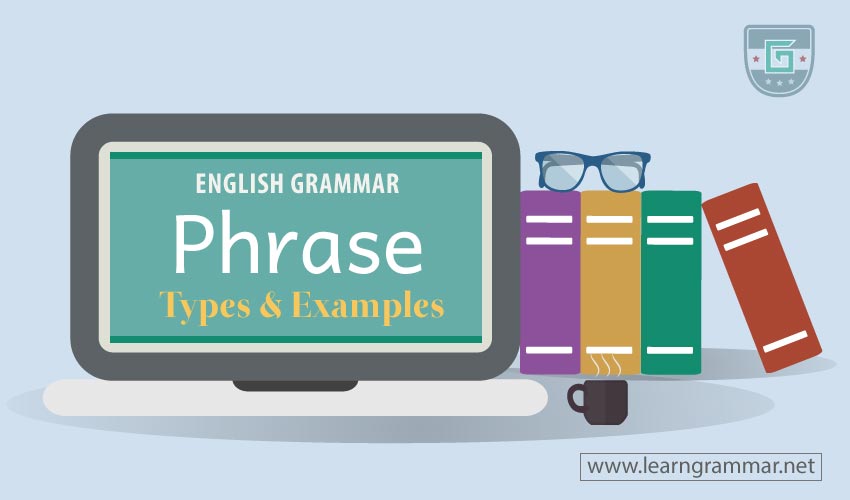What Is a Phrase That Backs Up a Compliant Icd Code
Phrase: Definition, Types & Examples

What is Phrase?
Phrases and clauses are the most important elements of English grammar. Phrase and clause cover everything a sentence has. Clauses are the center of sentences and phrases strengthen the sentences to become meaningful. If the clauses are the pillars of a building, the phrases are the bricks. A phrase usually is always present within a clause, but a phrase cannot have a clause in it.
The basic difference between a clause and a phrase is that a clause must have a finite verb and a phrase must not.
A phrase, therefore, is a group of words which has no finite verb in it and acts to complete the sentence for making it meaningful.
"A phrase is a small group of words that form a meaningful unit within a clause." -Oxford Dictionary
"In linguistic analysis, a phrase is a group of words (or possibly a single word) that functions as a constituent in the syntax of a sentence, a single unit within the grammatical hierarchy." - Osborne, Timothy, Michael Putnam, and Thomas Gross (2011)
Phrase Examples
Types of Phrases
The phrases are generally of several types.
- Noun Phrase
- Adjective Phrase
- Adverbial Phrase
- Prepositional Phrase
- Conjunctional Phrase
- Interjectional Phrase
- Absolute Phrase
- Appositive Phrase
- Participle Phrase
- Gerund Phrase
- Infinitive Phrase
Noun Phrase
It is usually assembled centering a single noun and works as a subject, an object or a complement in the sentence.
Example:
- I like to swing the bat hard when I am at the crease. (An object)
- Reading novels is a good habit. (A subject)
- The probability of happening that match is not much. (A subject)
- We are sorry for her departure.
Adjective Phrase
It is comprised of an adjective and works as a single adjective in the sentence.
Example:
- Alex is a well-behaved man.
- He is a man of friendly nature.
- Julie is a woman of gorgeous style.
- She leads a very interesting life.
- A lot of people do not sleep at night.
Adverbial Phrase
It modifies the verb or the adjective and works as an adverb in the sentence.
Example:
- The horse runs at a good speed.
- I was in a hurry then.
- I ran as fast as possible.
- He works very slowly.
Prepositional Phrase
It always begins with a preposition and connects nouns.
Example:
- He sacrificed his life for the sake of his country.
- In the end, we all have to die.
- He is on the way.
- By working aimlessly, you will not get success.
- In spite of working hard, he was insulted by his boss.
Note: Prepositional phrases include all other types of phrases.
Conjunctional Phrase
A conjunctional phrase works as a conjunction in the sentence.
Example:
- As soon as you got in, he went out.
- We have to work hard so that we can win the next match.
- I will attend the ceremony provided that you come.
- John started working early in order that he could finish early.
Interjectional Phrase
Interjections that have more than one word are calledinterjectional phrases.
Example:
- What a pity! He is dead.
- What a pleasure! I won the first prize.
- Oh please! Don't say that again.
Absolute Phrase
The phrases containing Noun or Pronoun accompanied by a participle and necessary modifiers if any are stated as Absolute Phrases. They modify indefinite classes and are also called Nominative Phrases.
Examples:
- Weather permitting, I will join the party.
- God willing, he'll pass the test this time.
- The hot Summer sun having set, we left for the movie
Appositive Phrase
An appositive is a Noun or Pronoun often accompanied by modifiers that sit beside another Noun or Pronoun to describe it. An Appositive Phrase is a set of words containing an Appositive and it follows or precedes the Noun or Pronoun it identifies or explains.
Examples:
- My school friend, Brooks always bunked classes.
- His colleague, Mr. Robinson likes his tea.
- Jeremy, the police officer on duty, wrote the speeding ticket.
Participle Phrase
It is made of a participle, its modifier(s) and/or the objects that complete the sense of the sentence.
Examples:
- Walking fast, I keep looking left and right.
- Climbing the stairs, she waved at us.
- I looked back, starting the engine.
Gerund Phrase
These contain a Gerund, its modifier(s) and the other necessary elements. They function as Nouns just like Gerunds themselves and that means they can be Subjects and Objects of the sentences.
Examples:
- Eating plenty of grapes in one sitting is a bad idea.
- Doing the dishes gives me cold allergies.
- I hate hurrying right before the deadline.
Infinitive Phrase
These are comprised of infinitive verbs (To + base verb)along with their modifiers and/or complements.
Examples:
- We love to cook together.
- He likes to solve math problems too much.
- Rina walks fast to be there on time.
What Is a Phrase That Backs Up a Compliant Icd Code
Source: https://www.learngrammar.net/english-grammar/phrase
0 Response to "What Is a Phrase That Backs Up a Compliant Icd Code"
Post a Comment